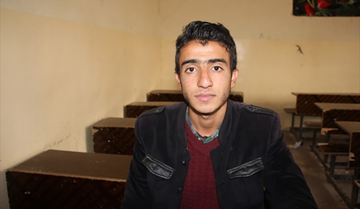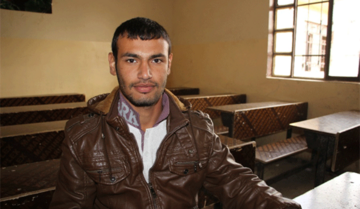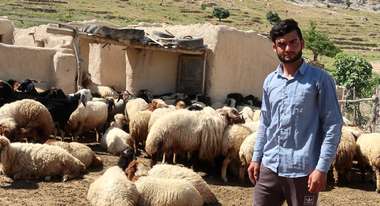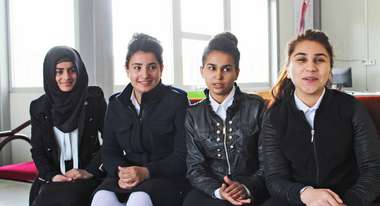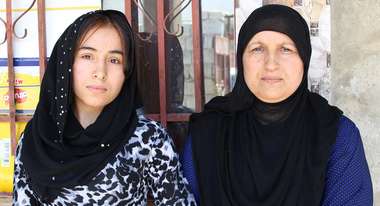New Perspectives for Iraqi Youth
The cold December wind blows through the broken windows into the classroom of the local high school for boys in Rabia, a city on the Iraqi-Syrian border. Kaveen and Barbar from the Welthungerhilfe social cohesion team are setting up for the first workshop of the day.
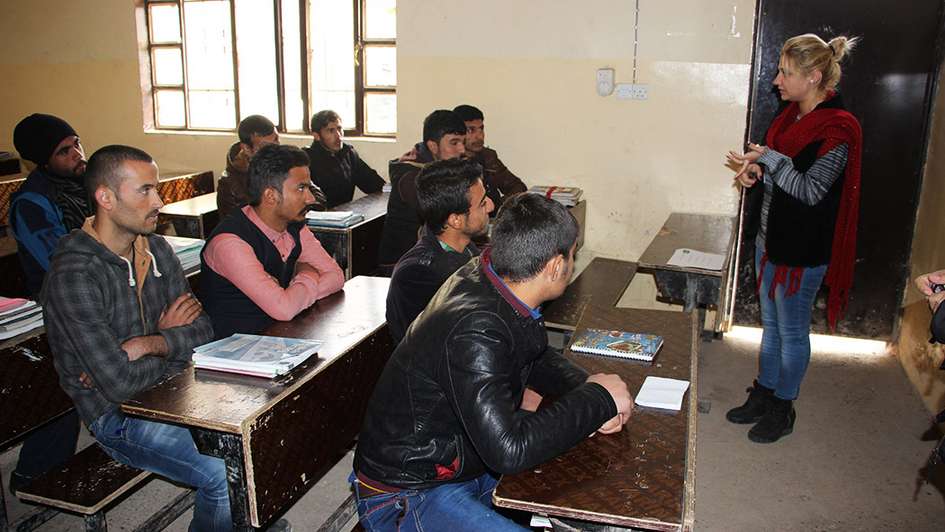
The topics are recycling, environmental awareness and the rehabilitation of the school building. “The windows in our classrooms are broken, the doors do not have doorknobs, we have no heating or toilets,” one of the students shares his frustration.
The school lacks even the most basic infrastructure. After the so-called Islamic State (IS) took control of Rabia and large parts of Nineveh Governorate in summer 2014, the majority of the inhabitants fled. When Kurdish and Iraqi forces retook the area from IS in late 2015, only around one third of the former population chose to return back home. The basic infrastructure in the city remains largely destroyed, economic opportunities are lacking and there are practically no jobs.
Support social cohesion
Despite the struggles they face in their daily lives, the students in Kaveen’s and Barbar’s class are excited about the workshop. After an introduction about Welthungerhilfe as an organisation, the young men learn about social cohesion – a term that describes the stable co-existence between Internally Displaced People (IDPs), refugees and host community members. Socio-ethnic differences, unequal access to income and other resources as well as a general feeling of insecurity often cause tensions between those communities.
The social cohesion activities are part of a project that aims at improving the livelihoods and living conditions of returnees as well as the local population in the northern Nineveh province. One goal is to actively involve the community in the shaping of the project activities. The social cohesion team therefore developed a method for the students to share their own thoughts about the improvements they would like to see in their school and their community. The young men are divided into small groups to discuss their ideas. When they proudly present their results it becomes clear that they lack neither ideas nor enthusiasm.
Ahmad: „We want a peaceful co-existence“
19-year old Ahmad and his family have been displaced multiple times already. Originally from Zumar district, they fled to Syria and came to Rabia in September 2016. He is new in the local high school, but his hopes are the same as everyone else’s. “We need to fix the broken windows and the missing door knobs. I also hope we will get toilets, trash bins and maybe even trees in the courtyard and educational posters in the classroom,” he adds. “We also want peaceful co-existence within the society and enhance women’s rights.”
Life for IDPs like Ahmad is anything but easy in Iraq. Ahmad’s three cousins used to study at Mosul University, which was moved to Dohuk because of the military operation in the city. His cousins never got the official permission from the local authorities to travel from northern Nineveh to Dohuk. They are unable to attend university and continue their studies. As Ahmad shares his personal story one thing becomes very apparent: Like many young people who have been victims of violent conflicts, the students gathered in this cold classroom on a grey December day feel forgotten about. “What I liked about the workshop today was that we were actually asked for our input. We have been waiting for a long time for an organisation to come here and actually take our needs into consideration,” he says.
Yassir’s priority: Improvement of education
Unlike Ahmad, Yassir was born and raised in Rabia. He comes from a family of farmers. When IS took over Rabia city in the summer of 2014 they were forced to flee to the surrounding villages and lost all their belongings. “We were lucky that we could stay with friends, but we lost everything,” he says.
Like so many others, Yassir and his family are trying to re-establish their lives in a community that lacks appropriate educational resources, public facilities and employment opportunities. Tribal disputes and poor re-integration schemes are additional challenges people in Rabia face.
For him, the improvement of the quality of education is a priority in his school. “We need more lecturers for maths, physics and biology,” he says. Like many other students, Yassir welcomed the workshop as a fun activity that made him forget about the pressure of constant studying. “I really liked that Welthungerhilfe believes in our own ability to improve the situation in our school,” he adds.
The social cohesion activities are part of a Welthungerhilfe project funded by the German Federal Government through its Association for International Cooperation (GIZ). Over the period of two and a half years Welthungerhilfe aims at improving the livelihoods and living conditions of returnees as well as the local population in northern Ninewa province. Using a multi-level approach, the project focusses on income improvement for vulnerable groups, rehabilitation of infrastructure, social cohesion as well as awareness raising about unexploded remnants of war.





